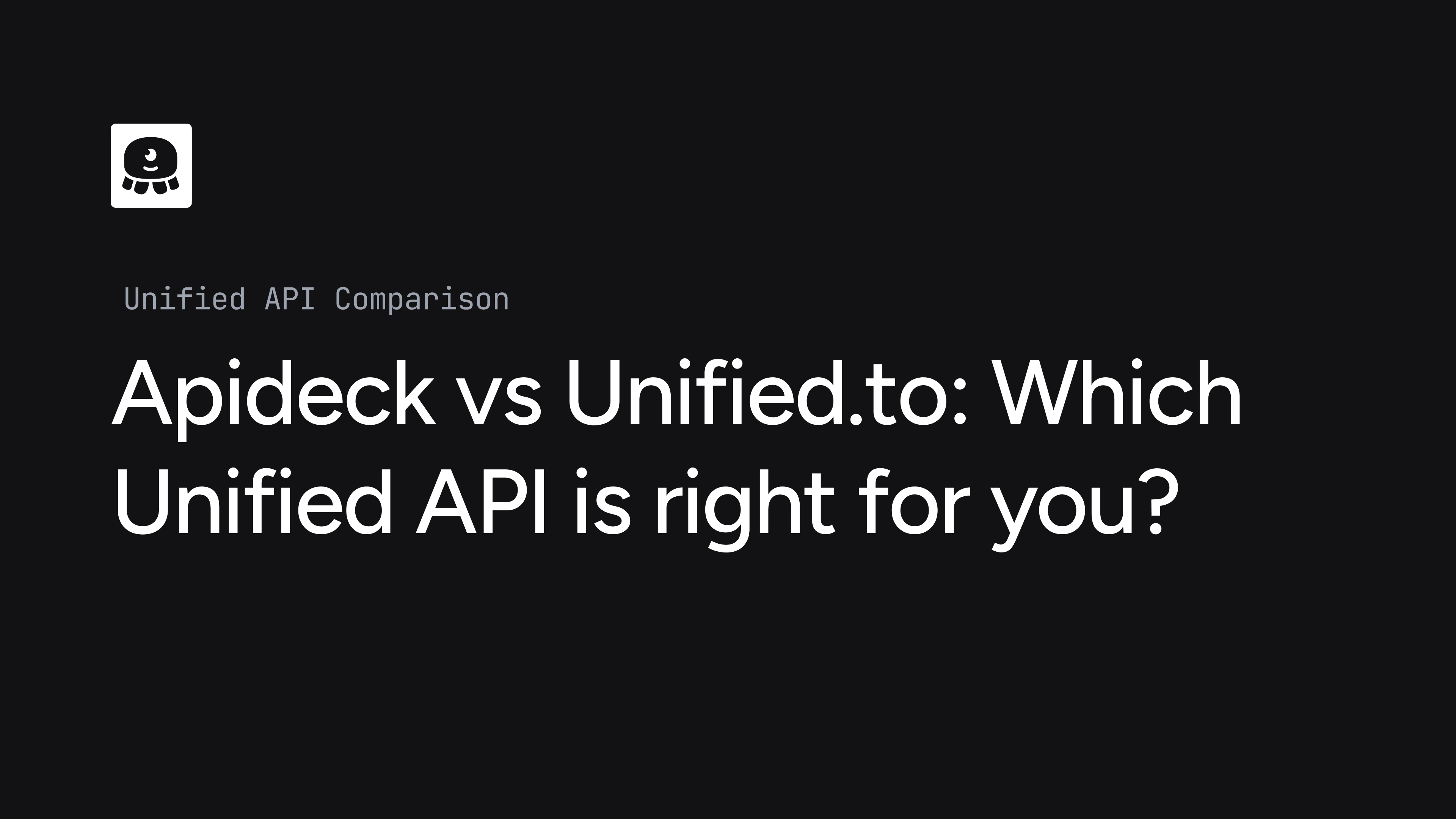Apideck vs. Unified.to: which Unified API Is built for real-time products?
October 2, 2025

Apideck helps teams ship integration marketplaces quickly using unified APIs and common data models. Unified.to helps teams build real-time, AI-powered products with structured data and zero storage risk.
If you're building a directory of integrations, Apideck can get you started. But if you need fresh data, cross-system logic, or pipelines for copilots and agents, Unified.to gives you more control.
At a glance: Unified.to vs Apideck
Apideck focuses on embedding integration catalogs with shared schemas. Unified.to is built for engineering teams that need real-time pipelines, structured records, and developer primitives.
Unified.to gives you:
- Real-time updates (via native + virtual webhooks)
- 270+ integrations across 20 categories
- Structured schemas with passthrough + custom field support
- Database sync: real-time ingestion into Postgres, Mongo, and more
- Zero-data architecture: no caching or persistence
- Transparent usage-based pricing with 30-day free trial
Real-time data without polling or cron jobs
Apideck provides native webhooks for some providers, but relies on polling for others. Virtual webhooks poll every 24 hours.
Unified.to is real-time by default. It uses native webhooks where supported, and emulates them with high-frequency polling where not. You don't manage jobs, retries, or state tracking. Unified.to emits consistent, structured events when data changes—no stale cache or delay.
One schema across systems—not just common fields
Apideck maps common fields per category (e.g. employees, companies). If you need full data access, you toggle Raw Mode and manage the transformation.
Unified.to provides deep, unified schemas for every object it supports—plus passthrough fields and access to raw payloads. Whether you're working with ATS, CRM, HRIS, or ticketing data, you get predictable fields, enums, and associations.
This unlocks complex workflows and AI use cases without losing flexibility.
Built-in database sync for structured records
Apideck supports webhooks and streaming via its API. You'll need to manage your own ingestion logic to write to a database.
Unified.to offers first-class Database Sync:
- Connect your Postgres, MongoDB, or MySQL instance
- Stream real-time records by object type
- No ETL, no transformation
Data lands normalized and current—ready for dashboards, agents, or analytics.
Zero data stored—no security liability
Apideck stores some customer data (like connected user info) even if it doesn't cache payloads. You'll need to audit what's stored and where.
Unified.to doesn't store end-user data or credentials. Requests proxy through to the source system in real time. You stay in control of where data flows and how it's handled.
Developer-first experience
Apideck offers SDKs, a visual explorer, and a well-documented sandbox for testing integrations. It's strong for teams launching embedded marketplaces.
Unified.to is built for engineers:
- SDKs in 7+ languages
- Open source Connect Component for React/Vue/Angular
- Daily SDK updates
- Postman and OpenAPI support
- Fast integration turnaround
Product teams use Unified.to to replace brittle ETL, cut integration time, and power complex, AI-native features.
TL;DR — Unified.to vs Apideck
| Feature | Unified.to | Apideck |
|---|---|---|
| Data model | Structured schemas with raw + custom field access | Common model + Raw Mode |
| Real-time support | Native + virtual webhooks (high-frequency polling) | Native webhooks + 24h polling virtual webhooks |
| AI readiness | Structured data + Database Sync for RAG, agents, LLMs | Supports MCP and API access to records |
| Database delivery | Real-time DB sync (Postgres, Mongo, MySQL, more) | No native DB sync—requires user-managed ingestion |
| Data storage | Zero-data architecture—no caching or persistence | Stores some user metadata; no payload caching |
| Developer experience | SDKs, auth component, structured logs, fast support | SDKs, visual explorer, good documentation |
| Scalability | Millions of API calls/mo; usage-based pricing | Tiered usage plans; free tier with 2.5k API calls |
| Positioning | Unified API for real-time, AI-native SaaS | Unified API for embedded integration catalogs |
| Pricing | Transparent usage-based plans starting at $350/mo | Free tier; paid tiers start at $299/mo |
| Best for | Engineering teams building live products and pipelines | SaaS teams launching app directories or app stores |
Apideck is a great choice for teams embedding app marketplaces with consistent UI and basic API access.
Unified.to is built for teams who need real-time data, structured pipelines, and AI-ready delivery—with developer control and no storage liability.
Start your free 30-day trial or book a demo to see Unified.to in action.
